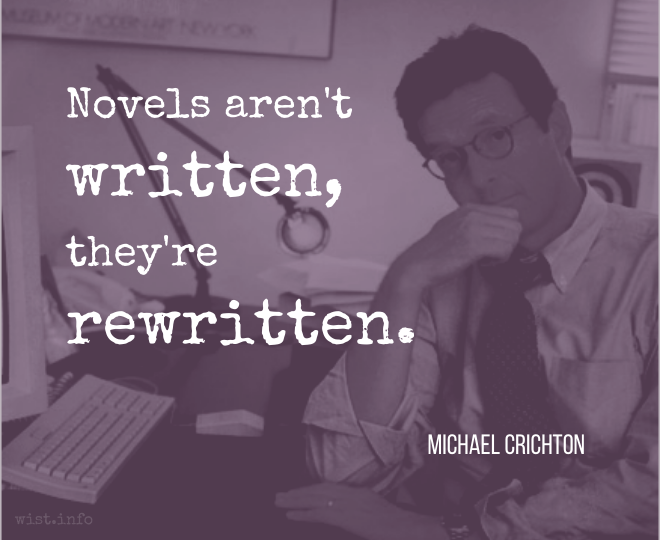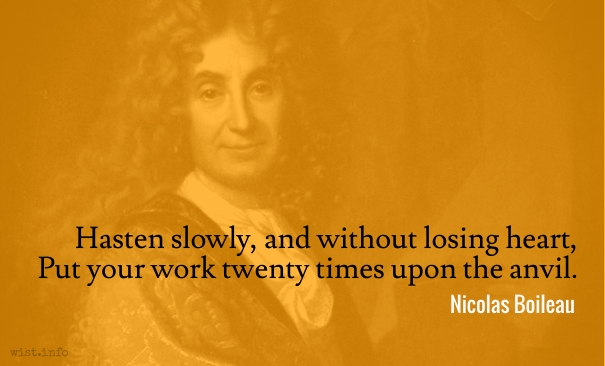A book is never finished, it is abandoned.
Gene Fowler (1890-1960) American journalist, author, and dramatist. [b. Eugene Devlan]
Quoted in H. Allen Smith, The Life and Legend of Gene Fowler, ch. 27 (1977)
(Source)
Quotations about:
editing
Note not all quotations have been tagged, so Search may find additional quotes on this topic.
You know that I write slowly. This is chiefly because I am never satisfied until I have said as much as possible in a few words, and writing briefly takes far more time than writing at length.
[Sie wissen, dass ich langsam schreibe, allein dies kommt hauptsächlich daher, weil ich mir nie anders gefallen kann, als wenn in kleinem Raum möglichst viel ist, und kurz zu schreiben viel mehr Zeit kostet als lang.]
Carl Friedrich Gauss (1777-1855) German mathematician, geodesist, physicist [Carolus Fridericus Gauss]
Letter to Heinrich Christian Schumacher (1833-04-02)
The letter, in German, can be found in Christian August Friedrich Peters (ed.), Briefwechsel zwischen C. F. Gauss und H. C. Schumacher, Vol. 2 (1860).
The English translation source for this quotation is obscure. It is quoted, without citation, in H. Merschkowski, Ways of Thought of Great Mathematicians (1964) and, more recently, G. Simmons, Calculus Gems (1992), and is usually referenced to one of those two books.
Should novels generally be 600 pages? No, they should not. Half of writing, maybe 3/4 of writing, is editing. This seems to be a thing that has not gotten through to them. It’s my impression that you could get rid of half of most of these books. These people are not good enough to be this long, but they’re apparently also not good enough to be shorter.
It is never too late — in fiction or in life — to revise.
Whoa, little book! Slow up! Easy there! Steady!
We’ve reached the finishing post, yet you’re still ready
To gallop uncontrollably on, to run
Past the last page, as if your job weren’t done.
(I’d have called it a day after page one!)
My reader’s fed up now, about to drop,
And my copyist, who longs to shut up shop,
Agrees: “Whoa, little book! Enough! Full stop!”[Ohe, iam satis est, ohe, libelle,
Iam pervenimus usque ad umbilicos.
Tu procedere adhuc et ire quaeris,
Nec summa potes in schida teneri,
5Sic tamquam tibi res peracta non sit,
Quae prima quoque pagina peracta est.
Iam lector queriturque deficitque,
Iam librarius hoc et ipse dicit
“Ohe, iam satis est, ohe, libelle.”]Martial (AD c.39-c.103) Spanish Roman poet, satirist, epigrammatist [Marcus Valerius Martialis]
Epigrams [Epigrammata], Book 4, epigram 89 (4.89) (AD 89) [tr. Michie (1972)]
(Source)
The last epigram in Book 4.
(Source (Latin)). Alternate translations:
Oh, 't is enough, it is enough, my book;
Upon the utmost page thou now dost look.
Would'st thou swell further yet? yet larger be?
Not leave thy paragraphs and margins free?
As if to some known period thou didst tend,
When ev'ry epigram may be thy end.
Reader and printer tired, no more can brook;
'T is time thyself pronounce the last line strook.
Oh, 't is enough, oh, 't is enough, my book.
[tr. Killigrew (1695)]
Enough, enough! little book! we have already reached the end of the parchment. You would still go on, and add to your bulk, and cannot confine yourself within due limits; just as if you had not done enough, when you had completed the first page. The reader is now quite querulous, and out of patience; the librarius himself now cries out, "Enough, enough, little book."
[tr. Bohn's Classical (1897)]
Ho, there! Ho, there! 'tis now enough, my little book. We have now come to the very end: you still want to go on further and continue, and cannot be held in even in your last strip, just as if your task was not finished -- which was finished, too, on the first page! Already my reader is grumbling and giving in; already even my scribe says: "Ho, there! Ho, there! 'tis enough now, little book."
[tr. Ker (1919)]
Hold, little book, enough, enough!
Here is the end of the scroll and thee;
Stay thy course ere the path grow rough,
Keep thy bounds for thou art not free,
Many thy sheets, though one should be
Ample space for thy sorry stuff.
Hold, little book, enough, enough!
Here is the end of the scroll and thee.
Wearied readers are harsh and gruff,
Now are they tired of thee and me;
Soon thou shalt meet a rude rebuff,
List to the worn-out scrivener’s plea;
‘Hold, little book, enough, enough!’
[tr. Pott & Wright (1921), "Finis"]
We've filled the scroll; "Hold, hold, enough!" I say,
But still you want to plod your inky way.
Heighho! 'tis finis, and the gap to fill
One page was plenty, yet you're restless still.
The reader flags and grumbles at the stuff,
And now the very penman cries "Enough."
[tr. Francis & Tatum (1924), No. 214]
Hold it, book, that's enough!
We've come to the knob at the end of the roll.
You object? And want to keep going right on
And can't sit still cooped up in the last column
on the last leaf? As though for you the work wasn't done
that was done when the first page was over and gone.
Your reader is tired, he's getting gruff,
the bookseller is losing interest in your stuff:
Hold it, book, that's enough!
[tr. Bovie (1970)]
Whoa, little book! Slow up! Easy there! Steady!
We've reached the finishing post, yet you're still ready
To gallop uncontrollably on, to run
Past the last page, as if your job weren't done.
(I'd have called it a day after page one!)
My reader's fed up now, about to drop,
And my copyist, who longs to shut up shop,
Agrees: "Whoa, little book! Enough! Full stop!"
[tr. Michie (1972)]
Whoa, there's enough, whoa now, little book! We have got to the bosses. But you want to go on further and keep going, there's no holding you at the final sheet, as though you had not finished the business which was finished even on page one. Already the reader grows querulous and weary, already the very copyist says "Whoa, there's enough, whoa now, little book!"
[tr. Shackleton Bailey (1993)]
Hey, you're stuffed, little book, give it a rest.
You've reached the end-papers and still have zest!
What on earth makes you yet want to let go,
When "misfire" our verse reeked from the get-go?
Zip it, my pages, let's call a "time out";
We've hit the back cover -- and still you'd spout?
Look, the reader's pissed and quite unimpressed;
Even our publisher calls you a pest:
"Hey, you're stuffed, little book, give it a rest!"
[tr. Schmidgall (2001)]
Slow down, my book, don't race beyond the goal
Or keep on trotting like a frisky foal.
You've used up all the paper in this roll.
Continuing, you'd make me lose control.
The reader says you might have gone too far,
My scribe says, "Hold your horses where they are."
[tr. Wills (2007)]
The whole truth would be an infinite concatenation of mostly irrelevant facts, with an occasional dose of, in textspeak, “TMI,” too much information — when, for example, you ruin the case you were making against factory farming by going into such detail about how painful de-beaking is for chickens that your listener shuts you out and struggles to think about something else. So we do not tell the whole truth; we tell carefully crafted stories, and we do this even when our moral purpose is to tell the truth.
Justin E. H. Smith (b. 1972) American-Canadian professor of history and philosophy of science
Irrationality: A History of the Dark Side of Reason, ch. 8 (2019)
(Source)
Don’t get discouraged because there’s a lot of mechanical work to writing. There is, and you can’t get out of it. I rewrote the first part of A Farewell to Arms at least fifty times. You’ve got to work it over. The first draft of anything is shit.
Let the reader find that he cannot afford to omit any line of your writing because you have omitted every word that he can spare.
Novels aren’t written, they’re rewritten. It is one of the hardest things to accept, especially after the seventh rewrite hasn’t quite done it.
Michael Crichton (1942-2008) American author, producer, director, and screenwriter
(Attributed)
Crichton was quoted a number of times on the adage, which he in turn claimed was in more general use. However, he seems to have been key in popularizing it. See here for more discussion and specific citations.
Hasten slowly, and without losing heart,
Put your work twenty times upon the anvil.[Hâtez-vous lentement ; et, sans perdre courage,
Vingt fois sur le métier remettez votre ouvrage.]
Often the fear of one evil leads us into a worse.
[Souvent la peur d’un mal nous conduit dans un pire.]
Nicolas Boileau-Despréaux (1636-1711) French poet and critic
The Art of Poetry [L’Art Poétique], Canto 1, l. 64 (1674)
(Source)
(Source (French)).
Though this sounds like a profound philosophical comment, in reality it refers to writers overcompensating for problems in their work. Soame (1892) translates this and the following line thus:
A verse was weak, you turn it much too strong.
And grow obscure for fear you should be long.
Remember that, sooner or later, before it ever reaches perfection, you will have to let it go and move on and start to write the next thing. Perfection is like chasing the horizon. Keep moving.
Neil Gaiman (b. 1960) British author, screenwriter, fabulist
In “Ten Rules for Writing Fiction,” The Guardian (20 Feb 2010)
(Source)
You can never read your own book with the innocent anticipation that comes with that first delicious page of a new book, because you wrote the thing. You’ve been backstage. You’ve seen how the rabbits were smuggled into the hat. Therefore ask a reading friend or two to look at it before you give it to anyone in the publishing business. This friend should not be someone with whom you have a romantic relationship, unless you want to break up.
Margaret Atwood (b. 1939) Canadian writer, literary critic, environmental activist
In “Ten Rules for Writing Fiction,” The Guardian (20 Feb 2010)
(Source)
You don’t always have to go so far as to murder your darlings — those turns of phrase or images of which you felt extra proud when they appeared on the page — but go back and look at them with a very beady eye. Almost always it turns out that they’d be better dead. (Not every little twinge of satisfaction is suspect — it’s the ones which amount to a sort of smug glee you must watch out for.)
Diana Athill (1917-2019) British literary editor, novelist, memoirist
In “Ten Rules for Writing Fiction,” The Guardian (20 Feb 2010)
(Source)
See Quiller-Couch.
Mostly, when I think of pacing, I go back to Elmore Leonard, who explained it so perfectly by saying he just left out the boring parts. This suggests cutting to speed the pace, and that’s what most of us end up having to do (kill your darlings, kill your darlings, even when it breaks your egocentric little scribbler’s heart, kill your darlings).
Try to leave out the part that readers tend to skip. Think of what you skip reading a novel: thick paragraphs of prose you can see have too many words in them.
Elmore Leonard (1925-2013) American novelist and screenwriter
In “Ten Rules for Writing Fiction,” The Guardian (20 Feb 2010)
(Source)
A frequent piece of advice from Leonard, e.g.:
- "I leave out the parts that people skip." When asked about the popularity of his detective novels. Quoted in William Zinsser, A Family of Readers (1986)
- "Try to leave out the part that readers tend to skip." In "Making It Up as I Go Along," AARP Magazine (Jul/Aug 2009).
I have only made this [letter] longer, because I have not had the time to make it shorter.
[Je n’ai fait celle-ci plus longue que parce que je n’ai pas eu le loisir de la faire plus courte.]
Blaise Pascal (1623-1662) French scientist and philosopher
Lettres provinciales, #16 (1657)
Alt. trans.: "The present letter is a very long one, simply because I had no leisure to make it shorter." Sometimes attributed to Ben Franklin or Mark Twain. For more information see here.
The best authors are always the severest critics of their own works; they revise, correct, file, and polish them, till they think they have brought them to perfection.
Lord Chesterfield (1694-1773) English statesman, wit [Philip Dormer Stanhope]
Letter to his son, #253 (6 May 1751)
(Source)
In composing, as a general rule, run your pen through every other word you have written; you have no idea what vigor it will give your style.
Sydney Smith (1771-1845) English clergyman, essayist, wit
Memoir of the Reverend Sydney Smith, by His Daughter, Lady Holland, Vol. 1, ch. 11 (1855)
(Source)
























